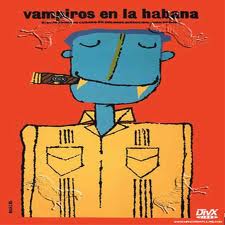Blog del Instituto Cervantes de Dublín
Torre Martello
Cine | Film Screening: Lo mejor de mí
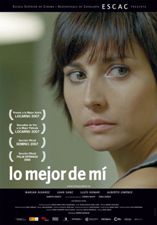 Continuamos con el ciclo de nuevos realizadores españoles. La proyección de hoy es Lo mejor de mí, de la directora Roser Aguilar, una fresca y sensible historia que puedes disfrutar hoy a las seis en nuestro Café Literario.
Continuamos con el ciclo de nuevos realizadores españoles. La proyección de hoy es Lo mejor de mí, de la directora Roser Aguilar, una fresca y sensible historia que puedes disfrutar hoy a las seis en nuestro Café Literario.
Cuando era pequeña, Raquel no podía entender por qué en todas partes se hablaba de amor: en la radio de casa, en la tele, en las películas del sábado por la tarde y, sobre todo, en las canciones. Y pensaba qué pasaría si no encontraba a nadie que la quisiera. Ahora Raquel se va a vivir con Tomás. Deberá plantearse qué está dispuesta a hacer por amor y descubrirá lo bonito y difícil de querer a alguien de verdad.
We keep offering you the best of new Spanish film makers. The film Lo mejor de mí, a fresh and sensitive story by Roser Aguilar will be screened today at 6pm at Café Literario.
When Raquel was a little girl she could not understand why everyone talked constantly about love: on the radio, on TV, in Saturday afternoon films and specially in songs. She always wondered what would happen if she did not find anyone who would love her. When Raquel moves in with Tomas, she will have to ask herself what she could be willing to do for love. She will discover how beautiful, and at the same how difficult, it is to truly love someone.
Cine | Film Screening: El vuelo del tren
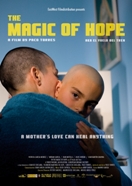 Comenzamos un nuevo ciclo de cine dedicado a los nuevos directores de nuestro cine. La película de hoy es El vuelo del tren que se proyectará a las 18:00 en el Café Literario. Para esta primera sesión contaremos con la presencia de su director, el realizador español afincado en Dublín Paco Torres y la cantante irlandesa Eleanor McEvoy, autora de dos temas de la película.
Comenzamos un nuevo ciclo de cine dedicado a los nuevos directores de nuestro cine. La película de hoy es El vuelo del tren que se proyectará a las 18:00 en el Café Literario. Para esta primera sesión contaremos con la presencia de su director, el realizador español afincado en Dublín Paco Torres y la cantante irlandesa Eleanor McEvoy, autora de dos temas de la película.
Blanca, es una madre soltera y luchadora que se enfrenta en el mejor momento de su vida a la posible pérdida de Aran, su única hija, cuando ésta le diagnostican leucemia. El dolor por la posible pérdida de su hija le hace sentir la verdadera dimensión del ser humano en un dramático realismo mágico que la llevará a despertar a la vida. Unas semanas en una gran cuidad. Una casa. Un hospital. Una familia, madre e hija. Un universo de magia, donde el amor y la perseverancia llevan a nuestros personajes a descubrir la esperanza a partir del sufrimiento y el dolor. Al final descubrimos que podemos aprender de otros siempre y cuando uno quiera.
Película seleccionada por la European Film Promotion in 2012 junto a Blancanieves y nominada a cuatro premios Asecan en 2012, así como la selección oficial de festivales como Galway Film Fleadh, PIFF y Festival de Cine Europeo de Sevilla.
Antes de la película se proyectará el último trabajo del director, el cortometraje Halowin(6 min.)
Today we start a new film series dedicated to Spanish new film directors. The first screening will be today at 6pm at Café Literario. The film is El vuelo del tren and its director, Paco Torres, and the Irish singer Eleanor McEvoy, author of two songs of the soundtrack, will attend this opening night to present the movie.
At the best moment in her life Blanca, a single mother and fighter has to face the possible loss of her only daughter, Aran when she is diagnosed with leukemia. The pain of possibly losing her daughter makes her realize the true dimension of human beings in a dramatic, magic realism which will bring her to open up to life. A few weeks in a big city. A house. A hospital. A family, mother and daughter. A magical world, where love and perseverance lead our characters to the discovery of hope through suffering and pain. Finally we realize we can learn from other people as long as we want to.
Selected by the European Film Promotion in 2012 with Blancanieves and nominated to four ASECAN Awards in 2012 and by the Galway Film Fleadh, PIFF (Pune International Film Festival) and the Seville European Film Festival.
The film will be preceded by the screening of Paco Torres’ last work, the short film Halowin(6 min).
Cine | Film screening: Vampiros en la Habana
Nos despedimos del ciclo de cine cubano con la película de animación Vampiros en la Habana. La película empieza a las 18:00 en el Café Literario. ¡Estáis todos invitados!
La divertida trama transcurre en 1933 y grupos dominantes de vampiros europeos y norteamericanos se dan cita en La Habana para hacerse con la fórmula de la mágica poción “Vampisol”, desarrollada por el científico alemán Werner Amadeus von Dracula, que permite a los vampiros exponerse al sol, sin ser afectados por los rayos ultravioleta.
La prueba viviente de la efectividad de la poción, Wolfgang Amadeus von Dracula, Pepito para sus amigos, es un divertido trompetista, que ha sido criado tan normalmente que desconoce por completo su origen vampiresco.
The last session of the Cuban film series will be today at 6pm at Cafe Literario where you can enjoy the animated film Vampiros en la Habana. All of you are invited!
The hilarious story is set in 1933. Dominant European and American vampire groups meet in Havana to get their hands on a fabulous new potion called “Vampisol”, developed by German scientist Werner Amadeus von Dracula, that lets vampires out into the sun without the harmful effects of UV rays.
Living proof of the successful potion is Wolfgang Amadeus von Dracula, Pepito to his friends, a carefree trumpet player, raised so normally that he has no idea he is a vampire.
Cine | Film screening: Kangamba
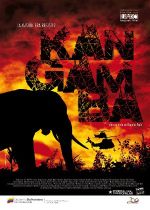 La tercera sesión del ciclo de cine cubano llega de la mano de la película Kangamba. ¡Ven a disfrutarla hoy a las 18:00 horas en el Café Literario!
La tercera sesión del ciclo de cine cubano llega de la mano de la película Kangamba. ¡Ven a disfrutarla hoy a las 18:00 horas en el Café Literario!
África, República Popular de Angola. Agosto de 1983. Miles de efectivos de la UNITA –entrenados y armados por el ejército sudafricano- lanzan una violenta ofensiva contra fuerzas de las FAPLA -leales al gobierno angolano- y un grupo de asesores cubanos, combatientes de las FAR, estacionados en CANGAMBA, pequeño poblado situado al sur del país. Durante más de una semana, se desarrolla una desigual batalla, que también golpea a la inocente población civil.
Este filme intenta reflejar y recrear esta dramática situación, en la cual los combatientes de las FAPLA y de las FAR, tratan de resistir y prevalecer, pero pagando un alto precio: la victoria, a veces, puede tener un amargo sabor.
The third session of the Cuban Film Series comes from the hand of Kangamba. Come to enjoy this film today at 6pm at Café Literario!
Africa, Popular Republic of Angola. August 1983. Thousands UNITA troops –trained and armed by the South African Army- launch a violent offensive against FAPLA forces –loyal to the Angolan government- and a group of Cuban advisers stationed in Cangamba, a small village in the South of the country. For over a week they engage in an unequal battle, which also hits the innocent civilian population. The film tries to present and recreate this dramatic situation, in which the FAPLA and the Cuban combatants try to resist and prevail, but at a very high price. Victory can sometimes have a bitter taste.
Cine | Film screening: Ninette
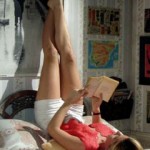 Una vez más José Luis Garci entra en el escenario teatral para mirarlo a través de la cámara de cine. En esta ocasión lo hace con la visión romántica y divertida que requiere una comedia como Ninette. El Café Literario abre hoy sus puertas a las 18:00 horas para ofrecerte esta divertida y entrañable película.
Una vez más José Luis Garci entra en el escenario teatral para mirarlo a través de la cámara de cine. En esta ocasión lo hace con la visión romántica y divertida que requiere una comedia como Ninette. El Café Literario abre hoy sus puertas a las 18:00 horas para ofrecerte esta divertida y entrañable película.
Ninette es la refundición y adaptación cinematográfica de las dos obras (Ninette y un señor de Murcia y Ninette, Modas de París) que Mihura dedicó a su personaje preferido, la inteligente, sexy, graciosa y espontánea muchacha parisina que trabaja en las Galerías Lafayette y que, a partir de ahora, siempre recordaremos con la sonrisa y figura de Elsa Pataky. La película Ninette, producida por Níkel Odeon y PC29, es el homenaje que Garci ofrece en su escenario a Miguel Mihura (1905-2005), uno de los máximos humoristas y dramaturgos del siglo XX.
Ninette Sánchez (Elsa Pataky), hija de emigrantes españoles en Francia, es una inteligente, sexy, graciosa y espontánea muchacha parisina que trabaja en las Galerías Lafayette. Con su naturalidad y belleza tiene enamorado a Andrés (Carlos Hipólito), un provinciano que no puede resistirse a sus encantos…
Once again José Luis Garci enters the theatre and looks at it through the film camera. On this occasion he does this from the romantic, amusing view point which a comedy such as Ninette requires. Café Literario opens today at 6pm to show this delightful and touching movie.
Ninette is a reworking and film adaptation of two works (Ninette and the Gentleman from Murcia and Ninette, Paris Fashions) which Mihura dedicated to his favourite character, the intelligent, sexy, amusing and spontaneous Parisian girl who works in Galerias Lafayette and who, from now on, will always be remembered with the smile and figure of Elsa Pataky. The film Ninette, produced by Nikel Odeon and PC29 is Garci´s homage to Miguel Mihura (1905-2005) one of the greatest humourists and dramatists of the twentieth century.
Ninette Sánchez (Elsa Pataky), daughter of Spanish immigrants in France, is an intelligent, sexy, amusing and spontaneous Parisian girl who works at Galleries Lafayette. Her natural manner and beauty have a great impact on Andrés (Carlos Hipólito), a countryside guy who cannot resist Ninnete´s charm…
Coloquio: Café-teatro científico en torno al cerebro | Discussion: Science café about the Brain
 Coincidiendo con la Semana de la Ciencia 2012, el Instituto Cervantes te trae una charla divulgativa en formato de café-teatro, que puedes disfrutar hoy a las 18:00 horas en el Café Literario. No olvides hacer tu reserva en reservas.dublin@cervantes.es
Coincidiendo con la Semana de la Ciencia 2012, el Instituto Cervantes te trae una charla divulgativa en formato de café-teatro, que puedes disfrutar hoy a las 18:00 horas en el Café Literario. No olvides hacer tu reserva en reservas.dublin@cervantes.es
¿Qué provoca las ilusiones visuales? ¿Por qué sufrimos pérdida de memoria? ¿Qué función tienen las neuronas? Si sientes un gran interés por el funcionamiento de nuestra mente y te gustaría aprender cosas en un tono desenfadado pero riguroso, no dejes pasar la oportunidad y asiste a esta charla llevada a cabo por un científico (Casto Rivadulla) y un actor (Vicente de Souza).
Disfruta de una bebida gratuita mientras asistes a la actividad.
During Science Week 2012, Instituto Cervantes brings you an informal and informative talk. You can enjoy it today at 6pm at Cafe Literario. Don´t forget make your reservation in reservas.dublin@cervantes.es
What creates visual illusions? Why do we suffer from memory loss? What is the function of neurons? If you are interested on how our mind works and you would like to learn more about it in an informal but accurate fashion, don’t miss this opportunity and come along to this talk hosted by a scientist and an actor.
Have a free drink while enjoying our science café.
Presentación de libro: “El ruido de las cosas al caer” de Juan Gabriel Vásquez | Book launch: “The sound of things falling” by Juan Gabriel Vásquez
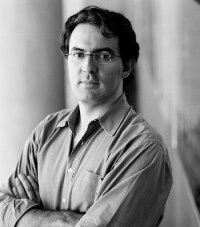 Hoy a partir de las 19:00 horas podrás disfrutar de la presentación de la traducción al inglés del último libro del autor colombiano Juan Gabriel Vásquez. El acto tendrá lugar en el Café Literario.
Hoy a partir de las 19:00 horas podrás disfrutar de la presentación de la traducción al inglés del último libro del autor colombiano Juan Gabriel Vásquez. El acto tendrá lugar en el Café Literario.
Se le considera uno de los mejores novelistas de su generación, y El ruido de las cosas al caer, que aborda el devenir de Colombia durante la época de Pablo Escobar, es hasta la fecha su mejor novela.
Tan pronto conoce a Ricardo Laverde, el joven Antonio Yammara comprende que en el pasado de su nuevo amigo hay un secreto, o quizá varios. Su atracción por la misteriosa vida de Laverde, nacida al hilo de sus encuentros en un billar, se transforma en verdadera obsesión el día en que éste es asesinado.
Convencido de que resolver el enigma de Laverde le señalará un camino en su encrucijada vital, Yammara emprende una investigación que se remonta a los primeros años setenta, cuando una generación de jóvenes idealistas fue testigo del nacimiento de un negocio que acabaría por llevar a Colombia —y al mundo— al borde del abismo.
Juan Gabriel Vásquez (Rosario, Colombia, 1973) estudió derecho en su ciudad natal y más tarde se doctoró en Literatura Latinoamericana en La Sorbona. Actualmente reside en Barcelona. Es autor de tres novelas “oficiales” —Los informantes, Historia secreta de Costaguana y El ruido de las cosas al caer—, aunque escribió otras cuando tenía 23 y 25 años de edad, que él prefiere eliminar. Sus novelas han sido traducidas en Inglaterra, Francia, Holanda, Italia y Polonia.
We are delighted to invite you to the book launch of the translation into English of the last novel written by Colombian writer Juan Gabriel Vásquez. The event will take place today at 7pm at Café Literario.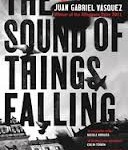
Juan Gabriel Vasquez is one of the leading novelists of his generation, and The Sound of Things Falling that tackles what became of Colombia in the time of Pablo Escobar is his best book to date.
No sooner does he get to know Ricardo Laverde than young Antonio Yammara realises that his new friend has a secret, or rather several secrets. Antonio’s fascination with the life of Laverde begins by casual acquaintance in a billiard hall and grows until the day Ricardo is murdered.
More out of love with life than ever, he starts asking questions until the questions become an obsession that leads him to Laverde’s daughter. His troubled investigation leads all the way back to the early 1960s, marijuana smuggling and a time before the cocaine trade trapped a whole generation of Colombians in a living nightmare of fear and random death.
Juan Gabriel Vásquez (Rosario, Colombia, 1973) studied law in his hometown and obtained a phd in Latin American Literature in the Sorbone University. At present he lives in Barcelona. He has published three “official” novels – The informers, The secret history of Costaguana and The Sound of Things Falling— however he wrote others at the age of 23 and 25 which he prefers to omit. His works have been translated in England, France, Netherlands, Italy and Poland.
[Video] Fernando Trueba en el Festival Isla de Literatura / Isla Literary Festival
Fernando Trueba participó en la mesa redonda «Palabras e imágenes: cine y literatura» junto a Mark O’Halloran y Javier Mariscal, moderados por Ciaran Carty. Fernando Trueba es entrevistado por Alfonso Fernández Cid. Edición de video: Cris Méndez.
Cine y literatura, la novela gráfica y cómo surgen historias narradas en imágenes y/o palabras fueron algunos temas de los invitados Javier Mariscal (diseñador), Fernando Trueba (director de cine) y Mark O’Halloran (actor y guionista). Modera: Ciaran Carty.
Fernando Trueba (Madrid, España, 1955) es guionista, editor y director de cine. Entre 1974 y 1979 trabajó como crítico de cine para El País y en 1980 fundó la revista mensual de cine Casablanca, la cual dirigió y editó durante los primeros dos años. En 1992, su película Belle Époque, obtuvo 9 premios Goya y, en 1993, obtiene el Oscar a la mejor película de habla no inglesa. En 1997 publica su libro Diccionario del cine y es editor del Diccionario del Jazz Latino (1998). Recientemente ha llevado al cine, junto al diseñador Javier Mariscal, la película de animación Chico y Rita, que ha recibido el Goya a la mejor película de animación y que fue seleccionada para el Oscar como Mejor Película de animación.
“Words and images, cinema and literature“.
Cinema and literature, graphic novel or how stories told in images or words come to life were some of the topics dealt with by guests Javier Mariscal (designer), Fernando Trueba (cinema director) and Mark O’Halloran (actor, script writer). Chaired by Ciaran Carty.
Fernando Trueba (Madrid, Spain, 1955) is a scriptwriter, editor and film director. Between 1974 and 1979 he worked as a film critic for Spain’s national daily newspaper El País and in 1980 he founded the monthly film magazine Casablanca, which he directed and edited during its first two years.
In 1992, his film Belle Époque received 9 Goya Awards and, in 1993, it was awarded the Oscar for Best Foreign Language film. In 1997 he published the book Diccionario del cine and is the editor of the Diccionario Del Jazz Latino.
He has recently brought Chico & Rita to the big screen working with designer Javier Mariscal. This film was awarded the Goya for Best Animated Film, as well as an Academy Award nomination for Best Animated Film.
Hoy leemos con | Today we are reading with: Ita Daly, Rafael Gumucio, Maighréad Medbh, Lorenzo Silva.
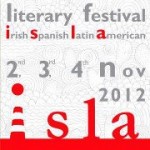 Para finalizar el Festival Literario ISLA, os ofrecemos unas lecturas en el Café Literario, el 4 de Noviembre a las 12.45.
Para finalizar el Festival Literario ISLA, os ofrecemos unas lecturas en el Café Literario, el 4 de Noviembre a las 12.45.
Última lectura del festival que clausura este festín literario con las voces de estos cuatro escritores que leerán una selección de su obra en su lengua original. Presenta: Megan Specia.
Ita Daly (Drumshanbo, Leitrim, Irlanda) ha publicado cinco novelas, una colección de cuentos y dos libros infantiles. Ha recibido el premio Hennessy Literary Award y el Irish Times Short Story Award. Su obra ha sido traducida al sueco, danés, japonés, italiano y alemán y sus relatos cortos han aparecido en revistas de Irlanda, Inglaterra y Estados Unidos. Uno de sus libros de relatos, The Lady With the Red Shoes, forma parte del plan de estudios de las escuelas de secundaria alemanas.
Rafael Gumucio (Santiago, Chile, 1970) es escritor y profesor de castellano y se licenció en Literatura por la Universidad de Chile. Ha trabajado como periodista en varios diarios. En 1995 publicó el libro de relatos Invierno en la Torre y Memorias Prematuras. Ha publicado también las novelasComedia Nupcial, Los Platos Rotos y Páginas Coloniales. Su última novela es La Deuda (2009). Actualmente es Director del Instituto de Estudios Humorísticos de la Universidad Diego Portales y co-conductor del programa Desde Zero en Radio Zero. Ha recibido el premio Anna Seghers, Alemania, 2002.
Máighréad Medbh (Condado de Limerick, Irlanda) ha publicado cinco libros de poesía y un audiolibro. Fue pionera de la performance poética en Irlanda en los años 90. Su colección más reciente es Twelve Beds for the Dreamer (2010). La obra de Máighréad ha sido publicada en una gran variedad de antologías y ha escrito versiones de poemas gallegos para dos antologías recientes editadas por Manuela Palacios (Universidad de Santiago de Compostela).
Lorenzo Silva (Madrid, España, 1966) ha escrito, entre otras, las novelas La flaqueza del bolcheviqueque ha sido llevada al cine por Manuel Martín Cuenca, y Carta blanca. Ha publicado también libros infantiles y juveniles, además de ensayos. Es especialmente conocido por la serie policíaca protagonizada por los investigadores Bevilacqua y Chamorro, iniciada conEl lejano país de los estanques (Premio Ojo Crítico 1998), y a la que siguió, entre otras, El alquimista impaciente (Premio Nadal 2000). Su último libro es Niños Feroces (2011). Su obra ha sido traducida a numerosos idiomas, como ruso, francés, alemán, italiano o griego.
To close the ISLA Literary Festival, we offer some readings at Café Literario, in November 4th at 12:45.
This literary festival will close with poetry readings by these four writers in their original language. Introduced by: Megan Specia.
(Drumshambo, Co. Leitrim) has published five novels, one collection of short stories and two books for children. She has won two Hennessy Literary Awards and an Irish Times Short Story Award. Her last novel, Unholy Ghosts (1997), was long listed for the International IMPAC Dublin Literary Award. Her work has been translated into Swedish, Danish, Japanese, Italian and German and her short stories have appeared in magazines in Ireland, England and America. Her short story collection The Lady With the Red Shoes (1980) is currently on the secondary school curriculum in Germany.
Rafael Gumucio (Santiago, Chile, 1970) has worked as a journalist for many Chilean and Spanish newspapers, as well as the New York Times. In 1995 he published the collection of short stories Invierno en la Torre and Memorias prematuras. He also published the novels Comedia Nupcial, Los Platos Rotos and Páginas Coloniales. His latest novel, La Deuda, was published in 2009. He now works as the director of the Institute for Humour Studies of the University Diego Portales and is co-conductor of Desde Zero at the radio station Zero. He received the Anna Seghers Award in Germany in 2002.
Máighréad Medbh (Co. Limerick) has five published poetry collections and an audio CD. She was a pioneer of performance poetry in Ireland in the nineteen-nineties. Her most recent collection, Twelve Beds for the Dreamer was published in 2010. Máighréad has been published in a wide range of anthologies, and has written versions of Galician poems for two recent anthologies edited by Manuela Palacios of Universidad de Santiago de Compostela.
Lorenzo Silva (Madrid, Spain, 1966) is author of novels such as La Flaqueza del Bolchevique which was adapted for cinema by Manuel Martín Cuenca, and Carta Blanca. He has also published books for children and young adults, as well as essays. He is especially known for the crime series starring detectives Bevilacqua and Chamorro, the series started with El lejano país de los estanques winner of the Ojo Crítico Award in 1998, and was followed by El Alquimista Impaciente winner of the Nadal Award in 2000, the later being adapted to cinema by Patricia Ferreira. His latest book Niños Feroces was published in 2011. His books have been translated into numerous languages such as Russian, French, German, Italian and Greek.
Mesa redonda | Round table discussion: Palabras e imágenes, cine y literatura. (Words and images, cinema and literature)
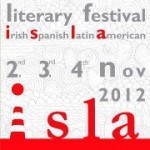 Comenzamos el último día del Festival Literario ISLA con una discusión literaria que tendrá lugar a las 11:00 en el Café Literario.
Comenzamos el último día del Festival Literario ISLA con una discusión literaria que tendrá lugar a las 11:00 en el Café Literario.
Cine y literatura, novela gráfica o cómo surgen historias narradas en imágenes y/o palabras serán algunos temas de los invitados Javier Mariscal (diseñador), Fernando Trueba (director de cine) y Mark O’Halloran (actor y guionista). Modera: Ciaran Carty.
Javier Mariscal (Valencia, 1950) es ante todo un creador de imágenes que desarrolla su trabajo en todo tipo de soportes y disciplinas. Junto con el equipo del Estudio Mariscal, que fundó en 1989, ha realizado numerosos proyectos internacionales (H&M, America’s Cup, Camper, etc.), además de la exposición sobre su trabajo Mariscal Drawing Life en el Design Museum de Londres y dos publicaciones monográficas: Mariscal Drawing Life y Sketches. En 2010, ha dirigido junto a Fernando Trueba, Chico y Rita y se ha publicado el cómic Chico & Rita. En 2011 ha publicado también el libro ilustrado Los Garriris.Chico & Rita se ha traducido al inglés en 2011, publicándose también en Francia y Países Bajos.
Mark O’Halloran (Ennis, Condado de Clare) es un dramaturgo, actor y guionista irlandés. Escribió el guión de dos películas muy aplaudidas en la escena cinematográfica: En la primera, Adam and Paul(2004) también asumió unos de los papeles principales, ganando con su trabajo el premio del Festival Internacional de Cine de Gijón al mejor actor (2005) y el Evening Standard British Film Award al mejor guión (2006). Su segunda película, Garage, se estrenó en el Festival de Cine de Cannes en el 2007 y ganó el premio CICAE a la mejor película, así como el Irish Film and Television Award al mejor guión de película (2008), entre muchos otros. También escribió el guión para la serie Prosperity, del canal RTE en 2007, por el cual ganó el Irish Film and Television Award al mejor guión de televisión (2008). Su última obra de teatro Trade se estrenó en el Festival de Teatro del Ulster Bank Dublin en septiembre de 2011.
Fernando Trueba (Madrid, España, 1955) es guionista, editor y director de cine. Entre 1974 y 1979 trabajó como crítico de cine para El País y en 1980 fundó la revista mensual de cine Casablanca, la cual dirigió y editó durante los primeros dos años. En 1992, su película Belle Époque, obtuvo 9 premios Goya y, en 1993, obtiene el Oscar a la mejor película de habla no inglesa. En 1997 publica su libroDiccionario del cine y es editor del Diccionario del Jazz Latino (1998). Recientemente ha llevado al cine, junto al diseñador Javier Mariscal, la película de animación Chico y Rita, que ha recibido el Goya a la mejor película de animación y que ha sido nominada al Óscar como Mejor Película de animación.
To begin the last day of ISLA Literary Festival, we start with a literary discussion that will take place at 11:00 in Café Literario.
Cinema and literature, graphic novel or how stories told in images or words come to life will be some of the topics dealt with by guests Javier Mariscal (designer), Fernando Trueba (cinema director) and Mark O’Halloran (actor, script writer). Chaired by Ciaran Carty.
Javier Mariscal (Valencia, 1950) is, first and foremost, an image creator who develops his work using all kinds of supports and disciplines. Together with the team of Estudio Mariscal, which he founded in 1989, in recent years, and among many other things, he has done several interior design and graphics (H&M, America’s Cup, Camper, etc), the exhibition of his work Mariscal Drawing Life in the Design Museum of London and two monographic publications: Mariscal Drawing Life and Sketches. In 2010, he premiered the full-length cartoon film Chico & Rita which he jointly directed with Fernando Trueba and produced the comic Chico & Rita. In 2011 he published the illustrated book Los Garriris. Chico & Rita has been translated into English in 2011 and has also been published in France and The Netherlands.
Mark O’Halloran (Ennis, Co. Clare) is an Irish playwright, actor and screen writer. He wrote the script for two critically lauded Irish films: On the first one, Adam and Paul (2004), he also took one of the leading roles, winning the Gijón International Film Festival Award for Best Actor (2005) and the Evening Standard British Film Award for Best Screenplay (2006). His second film, Garage, premièred at the Cannes Film Festival in 2007 and won the CICAE award for Best Film and the Irish Film and Television Award for Best Script for Film (2008), among many others. He also wrote the script for the four-part television series Prosperity on RTE in 2007, for which he won the Irish Film and Television Award for Best Script for Television (2008). His latest play Tradepremièred at the Ulster Bank Dublin Theatre Festival in September 2011.
Fernando Trueba (Madrid, Spain, 1955) is a scriptwriter, editor and film director. Between 1974 and 1979 he worked as a film critic for Spain’s national daily newspaper El Pais and in 1980 he founded the monthly film magazine Casablanca, which he directed and edited during its first two years. In 1992, his film Belle Époque received 9 Goya Awards and, in 1993, it was awarded the Oscar for Best Foreign Language film. In 1997 he published the book Diccionario del cine and is the editor of theDiccionario Del Jazz Latino. He has recently broughtChico & Rita to the big screen working with designer Javier Mariscal. This film was awarded the Goya for Best Animated Film, as well as an Academy Award nomination for Best Animated Film.
[Video] Lorenzo Silva en el Festival Isla de Literatura / Isla Literary Festival
Lorenzo Silva participó en la mesa redonda «Conflictos: ficción, humor y sociedad» junto a Bernardo Toro, María Negroni y Niamh O’Connor. Lorenzo Silva es entrevistado en este video Carmen Sanjulián. Edición de video: Cris Méndez.
Memoria histórica, conflictos nacionales o internacionales, crimen y cotidianidad fueron temas presentes en esta mesa gracias a la creación literaria de los invitados Lorenzo Silva, Bernardo Toro, María Negroni y Niamh O’Connor. Modera: Kate Quinn (NUI Galway)
Lorenzo Silva (Madrid, España, 1966) ha escrito, entre otras, las novelas “La flaqueza del bolchevique” (finalista del Premio Nadal 1997) que ha sido llevada al cine por Manuel Martín Cuenca, y “Carta blanca” (Premio Primavera 2004). Ha publicado también libros infantiles y juveniles, además de ensayos. Es especialmente conocido por la serie policíaca protagonizada por los investigadores Bevilacqua y Chamorro, iniciada con “El lejano país de los estanques” (Premio Ojo Crítico 1998), y a la que siguió, entre otras, “El alquimista impaciente” (Premio Nadal 2000), adaptada al cine por Patricia Ferreira. En 2011 publicó “Niños Feroces”. En 2012 ganó el Premio Planeta con “La marca del meridiano” Su obra ha sido traducida a numerosos idiomas, como ruso, francés, alemán, italiano o griego.
Historical memory, national or international conflicts and crime and daily life were the topics at this table thanks to literary works by guests Lorenzo Silva, Bernardo Toro, María Negroni and Niamh O’Connor. Chaired by Kate Quinn (NUI Galway).
Lorenzo Silva (Madrid, Spain, 1966) is author of novels such as “La Flaqueza del Bolchevique” which was short listed for the Nadal Award in 1997, and was adapted for cinema by Manuel Martín Cuenca, and “Carta Blanca” which won the Primavera Award in 2004. He has also published books for children and young adults, as well as essays. He is especially known for the crime series starring detectives Bevilacqua and Chamorro, the series started with “El lejano país de los estanques” winner of the Ojo Crítico Award in 1998, and was followed by “El Alquimista” Impaciente winner of the Nadal Award in 2000, the later being adapted to cinema by Patricia Ferreira. He published “Niños Feroces” in 2011, and in 2012 he won Premio Planeta award with “La marca del meridiano”.
His books have been translated into numerous languages such as Russian, French, German, Italian and Greek.
[Video] Kevin Barry en el Festival Isla de Literatura / Isla Literary Festival
Kevin Barry participó en una lectura literaria junto a Elia Barceló, Christopher Michael Domínguez, María Negroni y Keith Ridgway. Entrevistado por Sergio Angulo. Edición de video: Cris Méndez.
Kevin Barry nació en Limerick y vive en Sligo. Su primer libro de relatos, There are Little Kingdoms, ganó el Premio Rooney de Literatura Irlandesa en 2007. Ha escrito sobre viajes y literatura para The Guardian, The Irish Times, The Sydney Morning Herald y muchas otras publicaciones. Su primera novela, City of Bohane (2011) ha sido galardonada en Reino Unido con el Authors’ club Best First Novel Award, que premia a la mejor primera novela del año.
Kevin Barry was born in Limerick and now lives in Sligo. His first collection of short stories, There Are Little Kingdoms, won the Rooney Prize for Irish Literature in 2007. He has written about travel and literature for The Guardian, The Irish Times, The Sydney Morning Herald and many other publications. His debut novel City of Bohane (2011) recently won the Authors’ Club Best First Novel award in Britain.
[Video] Niamh O’Connor en el Festival Isla de Literatura / Isla Literary Festival
Niamh O’Connor participó en la mesa redonda “Conflictos: ficción, humor y sociedad” junto a Lorenzo Silva, Bernardo Toro y María Negroni. Niamh O’Connor es entrevistada por Sergio Angulo. Edición de video: Cris Méndez.
Memoria histórica, conflictos nacionales o internacionales, crimen y cotidianidad serán temas presentes en esta mesa gracias a la creación literaria de los invitados Lorenzo Silva, Bernardo Toro y Niamh O’Connor. Modera: Kate Quinn (NUI Galway)
Niamh O’Connor es una de las figuras más destacadas dentro del género policiaco de Irlanda, como escritora y como periodista. Como redactora de la sección de Sucesos del Sunday World, ha entrevistado a asesinos de triste fama y destapó una red internacional de prostitución como infiltrada. Se infiltró también en una banda que robó millones a los bancos mediante una estafa de hipotecas y que desencadenó una investigación por parte del Criminal Assets Bureau.
Ha escrito tres novelas dentro de la serie DI Jo Birmingham, If I Never See You Again, Taken, and Too Close For Comfort, nominada esta última a los premios Irish Book Awards 2012 en la categoría de novela negra. Worse can Happen saldrá publicada en 2013.
Niamh es también autora de los best-sellers Blood Ties, Cracking Crime y The Black Widow, the Catherine Nevin story, basados en hechos reales.
Historical memory, national or international conflicts and crime and daily life were topics at this table thanks to literary works by guests Lorenzo Silva, Bernardo Toro and Niamh O’Connor. Chaired by Kate Quinn (NUI Galway).
Niamh O’Connor is one of Ireland’s best-known true crime authors and journalists. As
True Crime Editor with the Sunday World, she has interviewed infamous murderers and gone undercover to expose an international prostitution ring. She has also infiltrated a gang running a mortgage fraud swindling the banks out of millions, leading to an investigation by the Criminal Assets Bureau.
Niamh has written three novels in the DI Jo Birmingham series, If I Never See You Again, Taken, and Too Close For Comfort which as been short listed for the Irish Book Awards 2012 Crime Fiction book of the year. Worse Can Happen is due out in 2013.
Niamh is also the bestselling true crime author of Blood Ties, Cracking Crime, and The Black Widow, the Catherine Nevin story.
[Video] Rafael Gumucio en el Festival Isla de Literatura / Isla Literary Festival
Rafael Gumucio participó en la mesa redonda «Escritores sin escrúpulos: intimidad, violencia y humor en literatura» / “Writers without scruples: Intimacy, violence and humour in literature“. Entrevistado por Carmen Sanjulián. Edición de video: Cris Méndez.
Temas como la identidad y la memoria, la violencia o el humor fueron tratados por los invitados Ita Daly, Christopher Domínguez Michael, Rafael Gumucio y Catherine Dunne, con la moderación de Ciaran Cosgrove (Trinity College Dublin).
Rafael Gumucio (Santiago, Chile, 1970) ha trabajado como periodista en numerosos diarios nacionales chilenos, españoles y en el New York Times. En 1995 publicó el libro de relatos Invierno en la Torre y Memorias Prematuras. Ha publicado también las novelas Comedia Nupcial, Los Platos Rotos y Páginas Coloniales. Su última novela es La Deuda (2009).
Actualmente es Director del Instituto de Estudios Humorísticos de la Universidad Diego Portales y co-conductor de Desde Zero en Radio Zero.
Topics such as identity and memory, violence or humour were dealt with by guests Ita Daly, Christopher Domínguez Michael, Rafael Gumucio and Catherine Dunne, chaired by Ciaran Cosgrove (Trinity College Dublin).
Rafael Gumucio (Santiago, Chile, 1970) has worked as a journalist for many Chilean and Spanish newspapers, as well as the New York Times. In 1995 he published the collection of short stories Invierno en la Torre and Memorias prematuras. He also published the novels Comedia Nupcial, Los Platos Rotos and Páginas Coloniales. His latest novel, La Deuda, was published in 2009.
He now works as the director of the Institute for Humour Studies of the University Diego Portales and is co-conductor of Desde Zero at the radio station Zero. He received the Anna Seghers Award in Germany in 2002.
http://dublin.cervantes.es/FichasCult…
[Video] Keith Ridgway en el Festival Isla de Literatura / Isla Literary Festival
Keith Ridgway participó en una lectura literaria junto a Elia Barceló, Christopher Michael Domínguez, María Negroni y Kevin Barry. Entrevistado por Megan Specia. Edición de video: Cris Méndez.
Keith Ridgway nació en Dublín en 1965. Su primera obra de ficción fue Horses (1997), a la que siguieron The Long Falling (1998), Standard Time (2000); un libro de relatos, The Parts (2003); Animals (2006) y Goo Book (2011). Su última novela publicada es Hawthorn & Child (2012).
Ha recibido numerosos premios, entre ellos el Prix Femina Etranger y el Prix Premier Roman en París en 2001 por The Long Falling bajo el título en francés Mauvais Pente, y el premio Rooney de literatura irlandesa en 2001. Las obras de Ridgway han sido traducidas a varios idiomas entre otros, el español.
Keith Ridgway (Dublin, 1965). His first fictional prose Horses was published in 1997, followed by The Long Falling (1998), Standard Time (2000). A collection of short fiction, The Parts (2003), Animals (2006), Goo Book (2011) and Hawthorn & Child (2012).
He has received numerous awards such as the Prix Femina Etranger and the Prix Premier Roman in Paris in 2001 for The Long Falling, under its French title of Mauvaise Pente, and The Rooney Prize For Irish Literature in 2001.
His work has been translated into several languages and has been published in Spain, between other countries.
